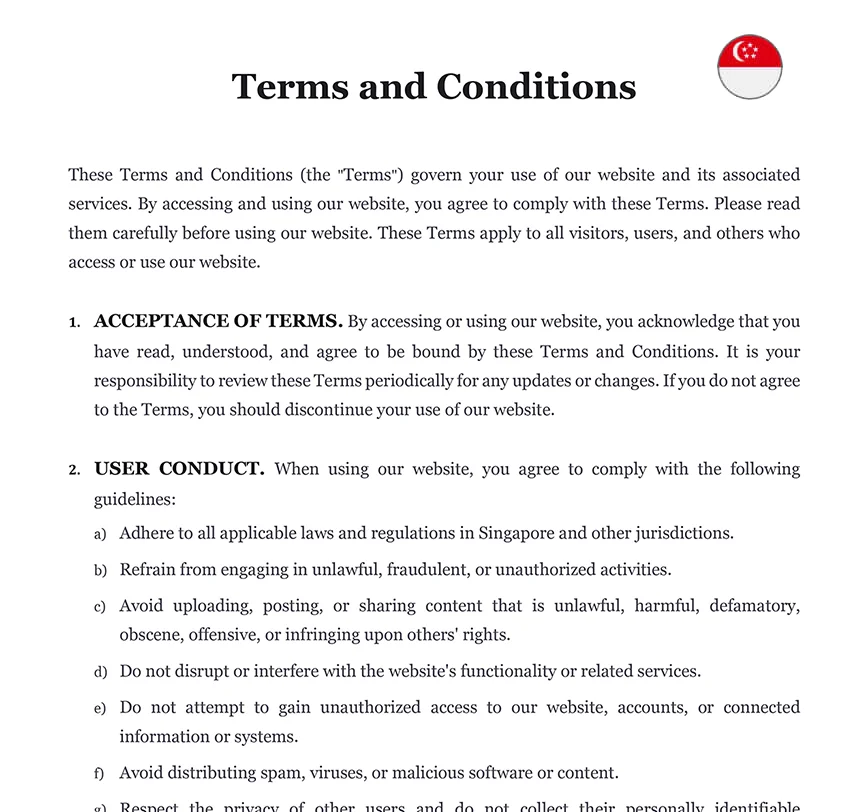Ready to use legal template
Drafted by experienced lawyers
Compliant with Singapore law
Ready to use legal template
Drafted by lawyers
Compliant with Singapore law
Home › Intellectual property › Terms and Conditions
Learn more about Website Terms and Conditions in Singapore
Are you looking to protect your website and set clear rules for its users? Website Terms and Conditions in Singapore are essential legal agreements that outline the terms of use and establish the relationship between a website owner and its visitors. Whether you run an e-commerce store, a blog, or any other type of website, having well-drafted Terms and Conditions is crucial to avoid disputes and legal issues. Themis Partner offers an easy-to-edit website Terms and Conditions template, drafted by experienced lawyers in accordance with the law in Singapore. Safeguard your online presence and ensure compliance with the relevant regulations with our comprehensive and user-friendly template.
📄 Related documents
Table of contents
-
What are Website Terms and Conditions in Singapore?
-
Why are Terms and Conditions important for my website?
-
Are Website Terms and Conditions legally required in Singapore?
-
What does Website Terms and Conditions include?
-
How can website Terms and Conditions protect my website and users?
-
What is the difference between T&C and Privacy Policy?
What are Website Terms and Conditions in Singapore?
Website Terms and Conditions in Singapore are a set of rules and guidelines that govern the use of a website by its visitors and users. They outline the rights, responsibilities, and obligations of both the website owner and the users when accessing and interacting with the site. These terms typically cover various aspects, including user conduct, intellectual property rights, disclaimers, privacy policies, and more. Having clear and well-defined Website Terms and Conditions is essential for protecting the website owner’s interests and ensuring a safe and transparent online experience for users.
Why are Terms and Conditions important for my website?
Website Terms and Conditions are essential for your website as they serve as a legally binding agreement between you (the website owner) and your website’s users. They clarify the rules and expectations for using your website, protecting both parties’ rights and preventing potential disputes. These terms outline user conduct, intellectual property rights, disclaimers, privacy policies, and other crucial information.
By having clear and comprehensive Terms and Conditions, you can minimize legal risks, set clear guidelines for users, and establish a professional and trustworthy online presence. It also helps to protect your intellectual property, limit liabilities, and comply with relevant laws and regulations in Singapore. Having well-drafted and comprehensive Website Terms and Conditions can provide several protections for website owners:
1. Limitation of Liability: By clearly defining the scope of your liability, you can limit potential legal claims against your website. You can specify that you are not responsible for any inaccuracies, errors, or damages that may arise from using the website’s content.
2. Intellectual Property Protection: You can assert your ownership of the website’s content, images, logos, and trademarks, and inform users that unauthorized use or reproduction is prohibited. This helps protect your intellectual property rights.
3. Governing Law and Jurisdiction: Including a clause that states the governing law and jurisdiction as Singapore helps ensure that any legal disputes will be handled according to Singaporean laws.
4. User Conduct: Setting out rules for user behavior, such as prohibiting spamming, hacking, or any illegal activities, helps maintain a safe and orderly website environment.
5. Privacy Policy: Incorporating a privacy policy into your Terms and Conditions is crucial for compliance with Singapore’s Personal Data Protection Act (PDPA). This policy informs users about how their personal data is collected, used, and protected.
6. Termination of Access: Clearly stating circumstances under which you can terminate or suspend a user’s access to the website helps in enforcing compliance with your website’s rules.
7. Modification of Terms: Reserving the right to modify the Terms and Conditions ensures that you can update them as needed, informing users of any changes.
8. Dispute Resolution: By including a clause on how disputes will be resolved, such as through arbitration or mediation, you can potentially avoid costly and time-consuming court battles.
ℹ️ Having clear and legally sound Website Terms and Conditions helps create transparency and trust between you and your users, safeguarding your interests while enhancing your website’s professionalism and credibility in the eyes of Singaporean users.
Are Website Terms and Conditions legally required in Singapore?
There is no specific law in Singapore that mandates every website to have Website Terms and Conditions. However, having well-drafted and comprehensive Terms and Conditions is highly recommended and considered a best practice for any website operating in Singapore.
While it may not be a legal requirement, having Website Terms and Conditions provides several benefits, such as protecting your intellectual property, limiting your liability, setting out user conduct rules, and complying with data protection regulations (such as the Personal Data Protection Act). It also helps establish a clear legal relationship between the website owner and the users, which can be valuable in the event of disputes.
Moreover, some specific industries or websites that handle sensitive data or transactions may have legal requirements to include certain terms in their Terms and Conditions to comply with sector-specific regulations.
- Remarks:
To ensure compliance with the most up-to-date legal requirements and best practices, it is advisable to consult with legal professionals or seek advice from Themis Partner, which offers easy-to-edit legal templates drafted by lawyers in accordance with Singaporean law.
What does Website Terms and Conditions include?
Website Terms and Conditions typically include a set of rules and guidelines that govern the use of a website and establish the legal relationship between the website owner and its users. While the specific content may vary depending on the nature of the website and its services, common elements found in Website Terms and Conditions include:
1. Acceptance of Terms
A clause stating that by using the website, users agree to be bound by the Terms and Conditions.
2. Intellectual Property
Information about the ownership of the website’s content, logos, trademarks, and copyrights.
3. User Conduct
Guidelines on how users should behave while using the website, including rules on prohibited activities, such as spamming or hacking.
4. Privacy Policy
Details on how the website collects, uses, stores, and protects users’ personal information.
5. Disclaimers
Statements limiting the website owner’s liability for the accuracy of information provided on the website and the consequences of using the website.
6. Limitation of Liability
Clauses that limit the website owner’s liability for any damages arising from the use of the website.
7. Governing Law and Jurisdiction
Information about the laws that govern the agreement and the jurisdiction where disputes will be resolved.
8. Modifications and Updates
A statement indicating that the website owner may update or modify the Terms and Conditions as needed, and how users will be informed of such changes.
9. Termination
Conditions under which the website owner can terminate a user’s access to the website.
How can website Terms and Conditions protect my website and users?
Website Terms and Conditions are essential legal documents that protect both website owners and users in Singapore. By establishing a legally binding agreement, defining user conduct, and safeguarding intellectual property, they help create a safe and respectful online environment. These terms also limit the website owner’s liability and provide privacy protection for users. Additionally, they specify governing law, jurisdiction, and the process for modifying or updating the terms. By including provisions for termination and suspension, website owners can address users who violate the terms.
Having well-drafted and comprehensive Terms and Conditions is crucial for instilling trust, demonstrating professionalism, and ensuring legal compliance. Using templates from reputable sources like Themis Partner can help ensure that the Terms and Conditions offer adequate protection and align with relevant laws in Singapore.
What is the difference between T&C and Privacy Policy?
Both T&C and Privacy Policy are crucial legal documents for any online business to protect their interests and respect users’ rights to privacy and data protection. The main difference between Terms and Conditions (T&C) and a Privacy Policy lies in their focus and scope.
| ➤ Terms and Conditions: T&C are a set of rules and guidelines that govern the use of a website or mobile app. They outline the terms under which users can access and interact with the website or app. T&C cover various aspects, such as user rights and responsibilities, intellectual property rights, disclaimers, liability limitations, and the governing law. These terms set the rules for the relationship between the website owner and the users and are legally binding upon acceptance by the users. |
| ➤ Privacy Policy: On the other hand, a Privacy Policy is a document that informs users about the collection, use, and disclosure of their personal data by the website or app. It explains how the website/app gathers, stores, and processes user information, including data such as names, contact details, and browsing behavior. A Privacy Policy is essential for transparency and compliance with data protection laws. It helps users understand how their personal data is handled and gives them the option to make informed decisions about using the website or app. |




